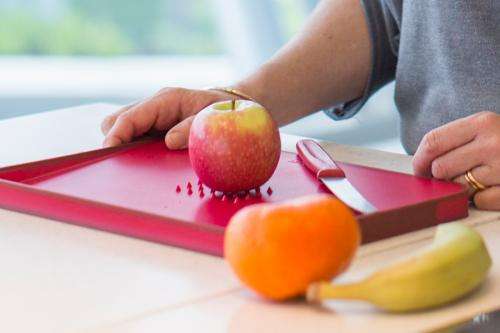Good design not an optional extra

Car parks can be frustrating places at the best of times. But for Sophie Marmont, whose hand strength and dexterity are affected by cerebral palsy, a badly designed car park can pose a real problem for daily living.
"I can manage things when they are close but when I have to reach out [for the ticket machine], I find that I lose dexterity. Surely car parking companies can devise other ways for people to enter and exit car parks?"
Marmont is constantly looking for innovative, beautiful products that she can use but she's found that people with disabilities are a neglected group when it comes to good design.
Consumer goods such as furniture and kitchen appliances are designed, first and foremost, for the able-bodied. Retro-fitting them or designing something specifically for older people or those with a disability can be complicated and expensive.
But good design and technology should be available to everyone, says the project manager at the Cerebral Palsy Alliance (CPA), Robyn Cummins.
Traditionally, people with disabilities have relied on products specifically designed for them, such as shower chairs and wheelchairs. The problem, says Cummins, is that many of these products haven't changed for more than 40 years.
"They look medical and people don't want them in their homes. We are interested in form as well as function [but] we are fighting a battle of the bland."
In a bid to encourage the mainstream design and technology community to embrace the concept of universal design—producing buildings, products and environments that are inherently accessible to older people and those with and without disabilities—the CPA has partnered with the University of Technology, Sydney (UTS) to host Australia's first Enabled by Design-athon.
Later this month, they will bring together product designers, engineers, entrepreneurs, UTS students, people with disabilities and disability professionals to swap ideas and experiment with prototypes.
With one in five Australians having some type of disability and with the population ageing rapidly, there is a ready market for well-designed products, says Cummins. However, she says there is still a place for assisted technology for people whose level of impairment is so great that products and environments have to be adapted to their particular needs.
Course Director in Industrial Design at the School of Design at UTS, Berto Pandolfo, says there is no shortage of students willing to apply themselves to the challenges of universal design.
"They sense that they have the ability to effect change and we encourage that," says Pandolfo. "The dilemma is that it's often difficult for them to continue with their projects beyond university."
Companies that might get involved tend to be small because they consider these products niche, says Pandolfo. "Larger companies are interested to see the capabilities and skills of our students but it is still a long road before products become a commercial reality."
The emergence of 3D printing could change all that, he says. "It offers an opportunity for young designers to go out on their own, develop a product and run their own company. With online retail possibilities, it's much easier to engage with the market."
Like everyone else, Marmont is interested in products that not only serve a purpose or fix a problem but look good too.
"I have a great cutting board from Joseph Joseph," she says. "It comes in bright, fashionable colours and has a non-slip surface. Importantly, it's edged and has little spikes in the centre so that if you're cutting vegetables, they don't roll off."
It may be a small kitchen tool but for Marmont it represents so much more—inclusion in daily life.
Provided by University of Technology, Sydney




















